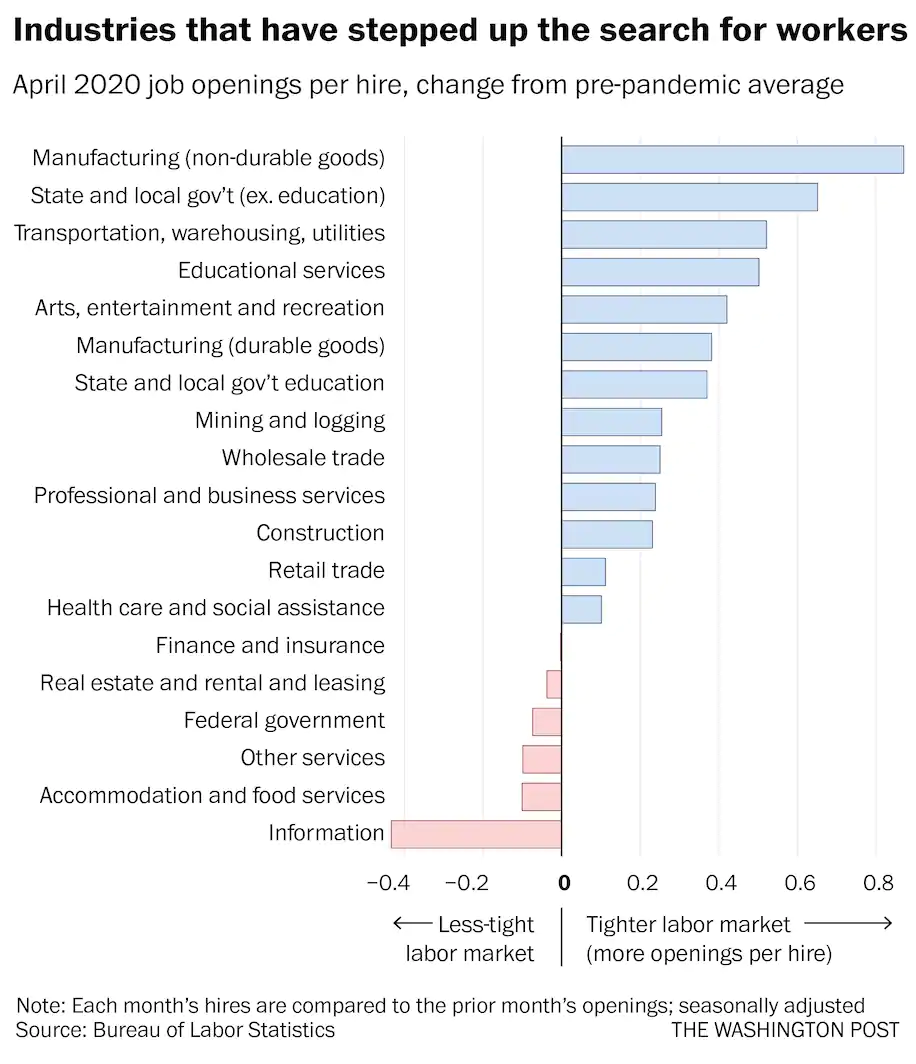My mid-week morning train WFH reads:
• The Economic Recovery Is Here. It’s Unlike Anything You’ve Seen. Unlike any in recent history, powered by consumers with trillions in extra savings, businesses eager to hire and enormous policy support. Businesses and workers are poised to emerge from the downturn with far less permanent damage than occurred after recent recessions, particularly the 2007-09 downturn. New businesses are popping up at the fastest pace on record. The rate at which workers quit their jobs—a proxy for confidence in the labor market—matches the highest going back at least to 2000. (Wall Street Journal)
• Why We Sometimes Die When Trying to Avoid Risk The roads were empty, yet fatal car crashes leaped last year during the pandemic. That’s not as weird as it seems. Psychologists call large, visible, but infrequent menaces like pandemics or terrorism “dread risks.” When we observe a catastrophic hazard that kills many people, we tend to fixate on it, and consequently often end up minimizing other more routine risks. Sometimes we’ll behave more recklessly in other aspects of our lives, which then increases our overall risk. (Bloomberg)
• The Brutal Truth About Bitcoin Despite their high valuations on paper, a collapse of Bitcoin and other cryptocurrencies is unlikely to rattle the financial system. Banks have mostly stayed on the sidelines. As with any speculative bubble, naïve investors who come to the party late are at greatest risk of losses. The government should certainly caution retail investors that, much like in the GameStop saga, they act at their own peril. Securities that enable speculation on Bitcoin prices are already regulated, but there is not much more the government can or ought to do. (New York Times)
• Wall Street isn’t to blame for the chaotic housing market The boogeyman isn’t who you want it to be. (Vox) but see World’s Bubbliest Housing Markets Flash 2008 Style Warnings New Zealand, Canada and Sweden rank as the world’s frothiest housing markets, based on key indicators. The U.K. and the U.S. are also near the top of the risk rankings. (Bloomberg)
• How ‘Chaos’ In the Shipping Industry Is Choking The Economy Economists are concerned that the plumbing provided by these miracle boxes and the vessels that transport them is clogged. It’s making it more difficult for stores to restock their shelves, manufacturers, carmakers and builders to get the parts they need, and farmers to export their products. It’s an important reason, analysts say, that we’re seeing consumer prices surge. (NPR)
• Fed explores ‘once in a century’ bid to remake the U.S. dollar The rise of private cryptocurrencies motivated the Fed to start considering a digital dollar to be used alongside the traditional paper currency. (Politico)
• How to Quit Your Job Gracefully There are right and wrong ways to head for the exits, in everything from your resignation letter to how you think about the work you’re leaving The Great Resignation is coming. A wave of employees looking for promotions, better pay and more flexible working arrangements say in surveys that they’ll be seeking new jobs in the coming months. About 26% of workers said they would search for a new gig when the threat of the pandemic decreases, according to Prudential’s Pulse of the American Worker Survey conducted in March. (Wall Street Journal)
• Why third jabs are inevitable The variants are going to keep on circulating without another vaccine (Unherd)
• Philosophy’s lack of progress: For centuries, all philosophers seem to have done is question and debate. Why do philosophical problems resist solution? (Aeon)
• Photos: California’s Growing Drought Disaster After two of the driest years in decades, many of California’s reservoirs are expected to reach record-setting lows this summer, four years after exiting the state’s most recent drought emergency. Lake Oroville, the second-largest reservoir in California, stands at about 37 percent of its capacity. A declared drought emergency for most of the state as farmers are coping with the lack of irrigation water, and fire crews are preparing for a potentially disastrous fire season. (The Atlantic)
Be sure to check out our Masters in Business interview this weekend with Brad Stone, BusinessWeek Technology editor, and author of the new book, Amazon Unbound: Jeff Bezos and the Invention of a Global Empire.
The seven industries most desperate for workers

Source: Washington Post

